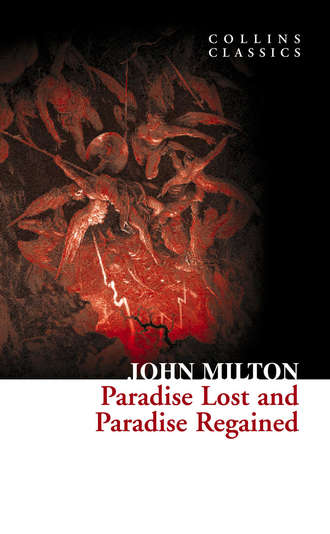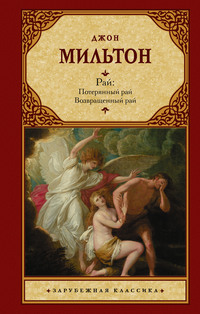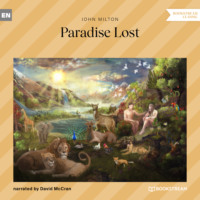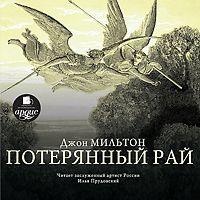
Полная версия
Paradise Lost and Paradise Regained
To vice industrious, but to nobler deeds
Timorous and slothful. Yet he pleased the ear,
And with persuasive accent thus began:—
“I should be much for open war, O Peers,
As not behind in hate, if what was urged
Main reason to persuade immediate war
Did not dissuade me most, and seem to cast
Ominous conjecture on the whole success;
When he who most excels in fact of arms,
In what he counsels and in what excels
Mistrustful, grounds his courage on despair
And utter dissolution, as the scope
Of all his aim, after some dire revenge.
First, what revenge? The towers of Heaven are filled
With armed watch, that render all access
Impregnable: oft on the bordering Deep
Encamp their legions, or with obscure wing
Scout far and wide into the realm of Night,
Scorning surprise. Or, could we break our way
By force, and at our heels all Hell should rise
With blackest insurrection to confound
Heaven’s purest light, yet our great Enemy,
All incorruptible, would on his throne
Sit unpolluted, and th’ ethereal mould,
Incapable of stain, would soon expel
Her mischief, and purge off the baser fire,
Victorious. Thus repulsed, our final hope
Is flat despair: we must exasperate
Th’ Almighty Victor to spend all his rage;
And that must end us; that must be our cure—
To be no more. Sad cure! for who would lose,
Though full of pain, this intellectual being,
Those thoughts that wander through eternity,
To perish rather, swallowed up and lost
In the wide womb of uncreated Night,
Devoid of sense and motion? And who knows,
Let this be good, whether our angry Foe
Can give it, or will ever? How he can
Is doubtful; that he never will is sure.
Will he, so wise, let loose at once his ire,
Belike through impotence or unaware,
To give his enemies their wish, and end
Them in his anger whom his anger saves
To punish endless? ‘Wherefore cease we, then?’
Say they who counsel war; ‘we are decreed,
Reserved, and destined to eternal woe;
Whatever doing, what can we suffer more,
What can we suffer worse?’ Is this, then, worst—
Thus sitting, thus consulting, thus in arms?
What when we fled amain, pursued and struck
With Heaven’s afflicting thunder, and besought
The Deep to shelter us? This Hell then seemed
A refuge from those wounds. Or when we lay
Chained on the burning lake? That sure was worse.
What if the breath that kindled those grim fires,
Awaked, should blow them into sevenfold rage,
And plunge us in the flames; or from above
Should intermitted vengeance arm again
His red right hand to plague us? What if all
Her stores were opened, and this firmament
Of Hell should spout her cataracts of fire,
Impendent horrors, threatening hideous fall
One day upon our heads; while we perhaps,
Designing or exhorting glorious war,
Caught in a fiery tempest, shall be hurled,
Each on his rock transfixed, the sport and prey
Or racking whirlwinds, or for ever sunk
Under yon boiling ocean, wrapt in chains,
There to converse with everlasting groans,
Unrespited, unpitied, unreprieved,
Ages of hopeless end? This would be worse.
War, therefore, open or concealed, alike
My voice dissuades; for what can force or guile
With him, or who deceive his mind, whose eye
Views all things at one view? He from Heaven’s height
All these our motions vain sees and derides,
Not more almighty to resist our might
Than wise to frustrate all our plots and wiles.
Shall we, then, live thus vile—the race of Heaven
Thus trampled, thus expelled, to suffer here
Chains and these torments? Better these than worse,
By my advice; since fate inevitable
Subdues us, and omnipotent decree,
The Victor’s will. To suffer, as to do,
Our strength is equal; nor the law unjust
That so ordains. This was at first resolved,
If we were wise, against so great a foe
Contending, and so doubtful what might fall.
I laugh when those who at the spear are bold
And venturous, if that fail them, shrink, and fear
What yet they know must follow—to endure
Exile, or igominy, or bonds, or pain,
The sentence of their Conqueror. This is now
Our doom; which if we can sustain and bear,
Our Supreme Foe in time may much remit
His anger, and perhaps, thus far removed,
Not mind us not offending, satisfied
With what is punished; whence these raging fires
Will slacken, if his breath stir not their flames.
Our purer essence then will overcome
Their noxious vapour; or, inured, not feel;
Or, changed at length, and to the place conformed
In temper and in nature, will receive
Familiar the fierce heat; and, void of pain,
This horror will grow mild, this darkness light;
Besides what hope the never-ending flight
Of future days may bring, what chance, what change
Worth waiting—since our present lot appears
For happy though but ill, for ill not worst,
If we procure not to ourselves more woe.”
Thus Belial, with words clothed in reason’s garb,
Counselled ignoble ease and peaceful sloth,
Not peace; and after him thus Mammon spake:—
“Either to disenthrone the King of Heaven
We war, if war be best, or to regain
Our own right lost. Him to unthrone we then
May hope, when everlasting Fate shall yield
To fickle Chance, and Chaos judge the strife.
The former, vain to hope, argues as vain
The latter; for what place can be for us
Within Heaven’s bound, unless Heaven’s Lord supreme
We overpower? Suppose he should relent
And publish grace to all, on promise made
Of new subjection; with what eyes could we
Stand in his presence humble, and receive
Strict laws imposed, to celebrate his throne
With warbled hymns, and to his Godhead sing
Forced hallelujahs, while he lordly sits
Our envied sovereign, and his altar breathes
Ambrosial odours and ambrosial flowers,
Our servile offerings? This must be our task
In Heaven, this our delight. How wearisome
Eternity so spent in worship paid
To whom we hate! Let us not then pursue,
By force impossible, by leave obtained
Unacceptable, though in Heaven, our state
Of splendid vassalage; but rather seek
Our own good from ourselves, and from our own
Live to ourselves, though in this vast recess,
Free and to none accountable, preferring
Hard liberty before the easy yoke
Of servile pomp. Our greatness will appear
Then most conspicuous when great things of small,
Useful of hurtful, prosperous of adverse,
We can create, and in what place soe’er
Thrive under evil, and work ease out of pain
Through labour and endurance. This deep world
Of darkness do we dread? How oft amidst
Thick clouds and dark doth Heaven’s all-ruling Sire
Choose to reside, his glory unobscured,
And with the majesty of darkness round
Covers his throne, from whence deep thunders roar.
Mustering their rage, and Heaven resembles Hell!
As he our darkness, cannot we his light
Imitate when we please? This desert soil
Wants not her hidden lustre, gems and gold;
Nor want we skill or art from whence to raise
Magnificence; and what can Heaven show more?
Our torments also may, in length of time,
Become our elements, these piercing fires
As soft as now severe, our temper changed
Into their temper; which must needs remove
The sensible of pain. All things invite
To peaceful counsels, and the settled state
Of order, how in safety best we may
Compose our present evils, with regard
Of what we are and where, dismissing quite
All thoughts of war. Ye have what I advise.”
He scarce had finished, when such murmur filled
Th’ assembly as when hollow rocks retain
The sound of blustering winds, which all night long
Had roused the sea, now with hoarse cadence lull
Seafaring men o’erwatched, whose bark by chance
Or pinnace, anchors in a craggy bay
After the tempest. Such applause was heard
As Mammon ended, and his sentence pleased,
Advising peace: for such another field
They dreaded worse than Hell; so much the fear
Of thunder and the sword of Michael
Wrought still within them; and no less desire
To found this nether empire, which might rise,
By policy and long process of time,
In emulation opposite to Heaven.
Which when Beelzebub perceived—than whom,
Satan except, none higher sat—with grave
Aspect he rose, and in his rising seemed
A pillar of state. Deep on his front engraven
Deliberation sat, and public care;
And princely counsel in his face yet shone,
Majestic, though in ruin. Sage he stood
With Atlantean shoulders, fit to bear
The weight of mightiest monarchies; his look
Drew audience and attention still as night
Or summer’s noontide air, while thus he spake:—
“Thrones and Imperial Powers, Offspring of Heaven,
Ethereal Virtues! or these titles now
Must we renounce, and, changing style, be called
Princes of Hell? for so the popular vote
Inclines—here to continue, and build up here
A growing empire; doubtless! while we dream,
And know not that the King of Heaven hath doomed
This place our dungeon, not our safe retreat
Beyond his potent arm, to live exempt
From Heaven’s high jurisdiction, in new league
Banded against his throne, but to remain
In strictest bondage, though thus far removed,
Under th’ inevitable curb, reserved
His captive multitude. For he, to be sure,
In height or depth, still first and last will reign
Sole king, and of his kingdom lose no part
By our revolt, but over Hell extend
His empire, and with iron sceptre rule
Us here, as with his golden those in Heaven.
What sit we then projecting peace and war?
War hath determined us and foiled with loss
Irreparable; terms of peace yet none
Vouchsafed or sought; for what peace will be given
To us enslaved, but custody severe,
And stripes and arbitrary punishment
Inflicted? and what peace can we return,
But, to our power, hostility and hate,
Untamed reluctance, and revenge, though slow,
Yet ever plotting how the Conqueror least
May reap his conquest, and may least rejoice
In doing what we most in suffering feel?
Nor will occasion want, nor shall we need
With dangerous expedition to invade
Heaven, whose high walls fear no assault or siege,
Or ambush from the Deep. What if we find
Some easier enterprise? There is a place
(If ancient and prophetic fame in Heaven
Err not)—another World, the happy seat
Of some new race, called Man, about this time
To be created like to us, though less
In power and excellence, but favoured more
Of him who rules above; so was his will
Pronounced among the Gods, and by an oath
That shook Heaven’s whole circumference confirmed.
Thither let us bend all our thoughts, to learn
What creatures there inhabit, of what mould
Or substance, how endued, and what their power
And where their weakness: how attempted best,
By force of subtlety. Though Heaven be shut,
And Heaven’s high Arbitrator sit secure
In his own strength, this place may lie exposed,
The utmost border of his kingdom, left
To their defence who hold it: here, perhaps,
Some advantageous act may be achieved
By sudden onset—either with Hell-fire
To waste his whole creation, or possess
All as our own, and drive, as we were driven,
The puny habitants; or, if not drive,
Seduce them to our party, that their God
May prove their foe, and with repenting hand
Abolish his own works. This would surpass
Common revenge, and interrupt his joy
In our confusion, and our joy upraise
In his disturbance; when his darling sons,
Hurled headlong to partake with us, shall curse
Their frail original, and faded bliss—
Faded so soon! Advise if this be worth
Attempting, or to sit in darkness here
Hatching vain empires.” Thus Beelzebub
Pleaded his devilish counsel—first devised
By Satan, and in part proposed: for whence,
But from the author of all ill, could spring
So deep a malice, to confound the race
Of mankind in one root, and Earth with Hell
To mingle and involve, done all to spite
The great Creator? But their spite still serves
His glory to augment. The bold design
Pleased highly those infernal States, and joy
Sparkled in all their eyes: with full assent
They vote: whereat his speech he thus renews:—
“Well have ye judged, well ended long debate,
Synod of Gods, and, like to what ye are,
Great things resolved, which from the lowest deep
Will once more lift us up, in spite of fate,
Nearer our ancient seat—perhaps in view
Of those bright confines, whence, with neighbouring arms,
And opportune excursion, we may chance
Re-enter Heaven; or else in some mild zone
Dwell, not unvisited of Heaven’s fair light,
Secure, and at the brightening orient beam
Purge off this gloom: the soft delicious air,
To heal the scar of these corrosive fires,
Shall breathe her balm. But, first, whom shall we send
In search of this new World? whom shall we find
Sufficient? who shall tempt with wandering feet
The dark, unbottomed, infinite Abyss,
And through the palpable obscure find out
His uncouth way, or spread his airy flight,
Upborne with indefatigable wings
Over the vast abrupt, ere he arrive
The happy Isle? What strength, what art, can then
Suffice, or what evasion bear him safe,
Through the strict senteries and stations thick
Of Angels watching round? Here he had need
All circumspection: and we now no less
Choice in our suffrage; for on whom we send
The weight of all, and our last hope, relies.”
This said, he sat; and expectation held
His look suspense, awaiting who appeared
To second, or oppose, or undertake
The perilous attempt. But all sat mute,
Pondering the danger with deep thoughts; and each
In other’s countenance read his own dismay,
Astonished. None among the choice and prime
Of those Heaven-warring champions could be found
So hardy as to proffer or accept,
Alone, the dreadful voyage; till, at last,
Satan, whom now transcendent glory raised
Above his fellows, with monarchal pride
Conscious of highest worth, unmoved thus spake:—
“O Progeny of Heaven! Empyreal Thrones!
With reason hath deep silence and demur
Seized us, though undismayed. Long is the way
And hard, that out of Hell leads up to light.
Our prison strong, this huge convex of fire,
Outrageous to devour, immures us round
Ninefold; and gates of burning adamant,
Barred over us, prohibit all egress.
These passed, if any pass, the void profound
Of unessential Night receives him next,
Wide-gaping, and with utter loss of being
Threatens him, plunged in that abortive gulf.
If thence he scape, into whatever world,
Or unknown region, what remains him less
Than unknown dangers, and as hard escape?
But I should ill become this throne, O Peers,
And this imperial sovereignty, adorned
With splendour, armed with power, if aught proposed
And judged of public moment in the shape
Of difficulty or danger, could deter
Me from attempting. Wherefore do I assume
These royalties, and not refuse to reign,
Refusing to accept as great a share
Of hazard as of honour, due alike
To him who reigns, and so much to him due
Of hazard more as he above the rest
High honoured sits? Go, therefore, mighty Powers,
Terror of Heaven, though fallen; intend at home,
While here shall be our home, what best may ease
The present misery, and render Hell
More tolerable; if there be cure or charm
To respite, or deceive, or slack the pain
Of this ill mansion: intermit no watch
Against a wakeful foe, while I abroad
Through all the coasts of dark destruction seek
Deliverance for us all. This enterprise
None shall partake with me.” Thus saying, rose
The Monarch, and prevented all reply;
Prudent lest, from his resolution raised,
Others among the chief might offer now,
Certain to be refused, what erst they feared,
And, so refused, might in opinion stand
His rivals, winning cheap the high repute
Which he through hazard huge must earn. But they
Dreaded not more th’ adventure than his voice
Forbidding; and at once with him they rose.
Their rising all at once was as the sound
Of thunder heard remote. Towards him they bend
With awful reverence prone, and as a God
Extol him equal to the Highest in Heaven.
Nor failed they to express how much they praised
That for the general safety he despised
His own: for neither do the Spirits damned
Lose all their virtue; lest bad men should boast
Their specious deeds on earth, which glory excites,
Or close ambition varnished o’er with zeal.
Thus they their doubtful consultations dark
Ended, rejoicing in their matchless Chief:
As, when from mountain-tops the dusky clouds
Ascending, while the north wind sleeps, o’erspread
Heaven’s cheerful face, the louring element
Scowls o’er the darkened landscape snow or shower,
If chance the radiant sun, with farewell sweet,
Extend his evening beam, the fields revive,
The birds their notes renew, and bleating herds
Attest their joy, that hill and valley rings.
O shame to men! Devil with devil damned
Firm concord holds; men only disagree
Of creatures rational, though under hope
Of heavenly grace, and, God proclaiming peace,
Yet live in hatred, enmity, and strife
Among themselves, and levy cruel wars
Wasting the earth, each other to destroy:
As if (which might induce us to accord)
Man had not hellish foes enow besides,
That day and night for his destruction wait!
The Stygian council thus dissolved; and forth
In order came the grand infernal Peers:
Midst came their mighty Paramount, and seemed
Alone th’ antagonist of Heaven, nor less
Than Hell’s dread Emperor, with pomp supreme,
And god-like imitated state: him round
A globe of fiery Seraphim enclosed
With bright emblazonry, and horrent arms.
Then of their session ended they bid cry
With trumpet’s regal sound the great result:
Toward the four winds four speedy Cherubim
Put to their mouths the sounding alchemy,
By herald’s voice explained; the hollow Abyss
Heard far and wide, and all the host of Hell
With deafening shout returned them loud acclaim.
Thence more at ease their minds, and somewhat raised
By false presumptuous hope, the ranged Powers
Disband; and, wandering, each his several way
Pursues, as inclination or sad choice
Leads him perplexed, where he may likeliest find
Truce to his restless thoughts, and entertain
The irksome hours, till his great Chief return.
Part on the plain, or in the air sublime,
Upon the wing or in swift race contend,
As at th’ Olympian games or Pythian fields;
Part curb their fiery steeds, or shun the goal
With rapid wheels, or fronted brigades form:
As when, to warn proud cities, war appears
Waged in the troubled sky, and armies rush
To battle in the clouds; before each van
Prick forth the airy knights, and couch their spears,
Till thickest legions close; with feats of arms
From either end of heaven the welkin burns.
Others, with vast Typhoean rage, more fell,
Rend up both rocks and hills, and ride the air
In whirlwind; Hell scarce holds the wild uproar:—
As when Alcides, from Oechalia crowned
With conquest, felt th’ envenomed robe, and tore
Through pain up by the roots Thessalian pines,
And Lichas from the top of Oeta threw
Into th’ Euboic sea. Others, more mild,
Retreated in a silent valley, sing
With notes angelical to many a harp
Their own heroic deeds, and hapless fall
By doom of battle, and complain that Fate
Free Virtue should enthrall to Force or Chance.
Their song was partial; but the harmony
(What could it less when Spirits immortal sing?)
Suspended Hell, and took with ravishment
The thronging audience. In discourse more sweet
(For Eloquence the Soul, Song charms the Sense)
Others apart sat on a hill retired,
In thoughts more elevate, and reasoned high
Of Providence, Foreknowledge, Will, and Fate—
Fixed fate, free will, foreknowledge absolute,
And found no end, in wandering mazes lost.
Of good and evil much they argued then,
Of happiness and final misery,
Passion and apathy, and glory and shame:
Vain wisdom all, and false philosophy!—
Yet, with a pleasing sorcery, could charm
Pain for a while or anguish, and excite
Fallacious hope, or arm th’ obdured breast
With stubborn patience as with triple steel.
Another part, in squadrons and gross bands,
On bold adventure to discover wide
That dismal world, if any clime perhaps
Might yield them easier habitation, bend
Four ways their flying march, along the banks
Of four infernal rivers, that disgorge
Into the burning lake their baleful streams—
Abhorred Styx, the flood of deadly hate;
Sad Acheron of sorrow, black and deep;
Cocytus, named of lamentation loud
Heard on the rueful stream; fierce Phlegethon,
Whose waves of torrent fire inflame with rage.
Far off from these, a slow and silent stream,
Lethe, the river of oblivion, rolls
Her watery labyrinth, whereof who drinks
Forthwith his former state and being forgets—
Forgets both joy and grief, pleasure and pain.
Beyond this flood a frozen continent









